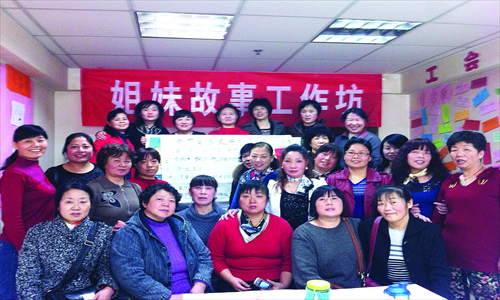Ayis unite to write manifesto

NGOs and domestic employees have joined forces to draft a manifesto in the form of a letter to give to families who employ a housekeeper, to draw attention to how the employees would like to be treated.
Around 3,000 copies of the letter will be handed to employers by their housekeepers in Beijing on Friday, International Women's Day.
Over 60 female housekeepers and three NGOs dealing with migrant workers' and women's rights based in Beijing and Shaanxi and Shandong provinces were involved in drawing up the letter.
The letter titled "A letter to employers," begins: "Today is March 8, International Women's Day, and also a day for housekeepers. Here we are writing down some words that we have not said before and we hope you can listen to our voices."
The letter lists 15 concerns that the housekeepers would like their employers to address. The first is "Please stop calling us babysitter." The Chinese term for babysitter, baomu, sounds derogatory when used to call the employee to do something. The word ayi (aunt), nanny or sister is preferred when introducing the employee to others.
Other requests include giving housekeepers time to eat a meal, not asking them to eat leftovers, following the contract, and allowing enough rest time. Respect and trust are the two most important elements, the letter says.
The three NGOs involved in the appeal are Home for Rural Women of Beijing Cultural Development Center for Rural Women in Beijing, the Jicheng Community Service Center in Ji'nan, Shandong Province, and the Housekeeping Labor Union of Xi'an in Shaanxi Province.
Han Huimin, the director of Home for Rural Women, said they have been collecting women's appeals for years.
"Although we have cooperated with governments and recruitment service providers to try and promote the long-overlooked issue of female housekeepers' rights, this is the first time we've tried to target employers who play the major role in the matter of domestic employees' rights," said Han.
Many employees only refer to their housekeeper as baomu. Given that the name "babysitter" has a similar meaning to a servant, this is an impolite way to address them, said Han.
A female housekeeper surnamed Bai from Hubei Province, said she welcomes the letter, as she has often been affected by situations similar to those detailed in the letter in her working life.
"We feel that we are not being respected sometimes," she said.
Bai said that some employers could fire them anytime they want without an excuse, which is unbearable.
"Some employers put cameras in a housekeeper's bedroom to supervise us," she said.
Bai noted that another major issue which is rather common is sexual harrassment and it should be added to the appeal letter.
"I was harassed by a 70-year-old man who tried to take advantage of me while I was cleaning his bedroom," she said.
An employer surnamed Huang said she has always treated her housekeeper, who she refers to as ayi or nanny, as a member of the family.
"I won't say it's impolite to call them baomu since different people might have different preferences on their name," she said.
Huang said that she thinks that some problems do not come from employers but from the employees themselves.
"For instance, they often decide when they want to work," she said.
Huang noted that this unstable service is unacceptable.
"Besides, we don't want to change housekeepers very often, since we need time to build up the trust in each other," she said.
Guo Jianmei, a well-known lawyer and women's rights advocate, said the need for such a letter is rooted in the immature level of China's domestic service industry.
"On one hand, the housekeepers are not protected by labor laws, but on the other, the market is not well-regulated, so that often housekeepers start work without any training," she said. "This industry needs legal protection and more government scrutiny."